
Runcorn is an industrial town and cargo port in the Borough of Halton in Cheshire, England. Its population in 2011 was 61,789. Runcorn is on the southern bank of the River Mersey, where the estuary narrows to form the Runcorn Gap.
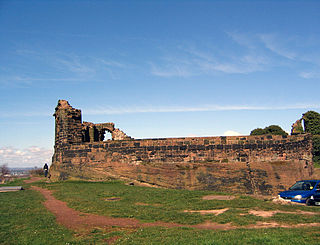
Halton, formerly a separate village, is now part of the town of Runcorn, Cheshire, England. The name Halton has been assumed by the Borough of Halton, which includes Runcorn, Widnes and some outlying parishes.
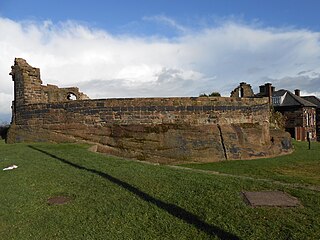
Halton Castle is a castle in the village of Halton, part of the town of Runcorn, Cheshire, England. The castle is on the top of Halton Hill, a sandstone prominence overlooking the village. The original building, a motte-and-bailey castle began in 1071, was replaced with the current sandstone castle in the 13th century. Building alterations continued until at least 1609, when the structure is recorded as in disrepair. The castle is recorded in the National Heritage List for England as a designated Grade I listed building, and a scheduled ancient monument.

Runcorn is an industrial town in Halton, Cheshire, England, on the south bank of the River Mersey where it narrows at Runcorn Gap. In the town are the 61 buildings that are recorded in the National Heritage List for England as designated listed buildings in the current urban area of Runcorn, including the districts of Runcorn, Halton, Weston, Weston Point, and Norton. Two of these are classified as being in Grade I, nine in Grade II*, and fifty in Grade II.

Widnes is an industrial town in the Borough of Halton, Cheshire, England, on the north bank of the River Mersey where it narrows at Runcorn Gap. The town contains 24 buildings that are recorded in the National Heritage List for England as designated listed buildings. Of these, 5 are classified at Grade II*, and the rest are at Grade II; Widnes has no Grade I listed buildings. In the United Kingdom, the term "listed building" refers to a building or other structure officially designated as being of special architectural, historical, or cultural significance. Listed buildings are categorised in three grades: Grade I consists of buildings of outstanding architectural or historical interest; Grade II* includes particularly significant buildings of more than local interest; Grade II consists of buildings of special architectural or historical interest. Buildings in England are listed by the Secretary of State for Culture, Media and Sport on recommendations provided by English Heritage, which also determines the grading.

St Peter's Church is in the small hamlet of Aston-by-Sutton, Cheshire near to the town of Runcorn. The church is recorded in the National Heritage List for England as a designated Grade I listed building. It is an active Anglican parish church in the diocese of Chester, the archdeaconry of Chester and the deanery of Great Budworth. It is one of three parish churches in the parish of Aston-by-Sutton, Little Leigh and Lower Whitley. The other two being St Michael and All Angels, Little Leigh and St Luke, Lower Whitley. The three were previously individual parishes united in a benefice along with St Mark, Antrobus. The listing describes it as "a most pleasing late 17th to early 18th-century church, inside and out". The church stands in a relatively isolated position in the south side of Aston Lane in the hamlet.

St John the Evangelist's Church is in Weston, once a separate village and now part of the town of Runcorn, Cheshire, England. The church is recorded in the National Heritage List for England as a designated Grade II* listed building. It is an active Anglican parish church in the diocese of Chester, the archdeaconry of Chester and the deanery of Frodsham. Its design has been described as "bold and original".

Holy Trinity Church is in Runcorn, Cheshire, England. It is an active Anglican parish church in the diocese of Chester, the archdeaconry of Chester and the deanery of Frodsham. Its benefice is combined with that of All Saints, Runcorn. It is recorded in the National Heritage List for England as a designated Grade II listed building.
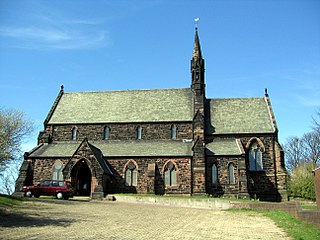
St Mary's Church is in Halton, which was formerly a separate village, but is now part of the town of Runcorn, Cheshire, England. It is an active Anglican parish church in the diocese of Chester, the archdeaconry of Chester and the deanery of Frodsham. The church is recorded in the National Heritage List for England as a designated Grade II listed building.

All Saints' Church is the parish church of Runcorn, Cheshire, England, sited on the south bank of the River Mersey overlooking Runcorn Gap. There is a tradition that the first church on the site was founded by Ethelfleda in 915. That was replaced, probably in about 1250, by a medieval church that was altered and extended in the 14th and 15th centuries. By the 19th century the building's structure had deteriorated and become dangerous, and it was replaced by a new church, built between 1847 and 1849 to the designs of Anthony Salvin.

Oakmere Hall is a large house to the southwest of the villages of Cuddington and Sandiway, Cheshire, England, near the junction of the A49 and A556 roads. It is recorded in the National Heritage List for England as a designated Grade II listed building. It was originally a private house and later became a rehabilitation centre and hospital. It has since been divided into residential apartments.
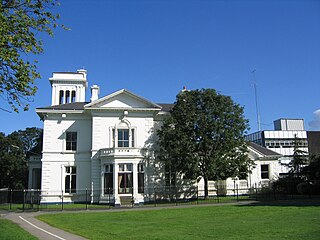
Runcorn Town Hall is in Heath Road, Runcorn, Cheshire, England. It is recorded in the National Heritage List for England as a designated Grade II listed building. It was originally built as Halton Grange, a mansion for Thomas Johnson, a local industrialist. After passing through the ownership of two other industrialists, it was purchased in the 1930s by Runcorn Urban District Council and converted into their offices. Since 1974, it has been the meeting place for Halton Borough Council.

Bridgewater House is in the Old Coach Road, Runcorn, Cheshire, England. It is recorded in the National Heritage List for England as a designated Grade II listed building. Originally built for the use of the Duke of Bridgewater, it has since has been used for various purposes and has now been converted into offices.

Hallwood is a former mansion house in Runcorn, Cheshire, England. One wing of the house remains and was a public house called the Tricorn until its closure in 2017. Its former stables were converted into a function room for the public house. The remaining wing of Hallwood is recorded in the National Heritage List for England as a designated Grade II* listed building; the former stables are listed at Grade II.

Halton Old Hall is a house in the village of Halton in Runcorn, Cheshire, England. It is recorded in the National Heritage List for England as a designated Grade II* listed building. The house dates from 1693, and is built in sandstone with a slate roof. It has two storeys and an attic; a two-storey wing has been added to the back. The windows have mullions and the gables have corbels and copings. Both Starkey and Nikolaus Pevsner note that its style is older than its date.
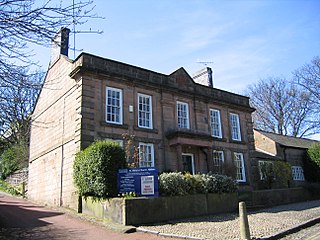
Halton Vicarage is in Castle Road, Halton in the town of Runcorn, Cheshire, England. It is recorded in the National Heritage List for England as a designated Grade II* listed building.

The Carnegie Library is in Egerton Street, Runcorn, Cheshire, England. It is recorded in the National Heritage List for England as a designated Grade II listed building and "possesses special architectural and historic interest within a national context". It was built in 1906 as an extension to Waterloo House and the existing library with a grant from Andrew Carnegie, and closed in 2012.

Runcorn is an industrial town in the borough of Halton, Cheshire, England. This list contains the 27 buildings that are recorded in the National Heritage List for England as designated listed buildings in the part of the borough lying to the south of the River Mersey outside the urban area of Runcorn. The area covered includes the villages of Clifton, Daresbury, Preston Brook, Preston on the Hill, and Moore. Three of the buildings in the area are classified as Grade II*, and the others are at Grade II; there are no buildings in Grade I. In the United Kingdom, the term listed building refers to a building or other structure officially designated as being of special architectural, historical, or cultural significance. These buildings are in three grades: Grade I consists of buildings of outstanding architectural or historical interest; Grade II* includes particularly significant buildings of more than local interest; Grade II consists of buildings of special architectural or historical interest. Buildings in England are listed by the Secretary of State for Culture, Media and Sport on recommendations provided by English Heritage, which also determines the grading.
There are over 9,000 Grade I listed buildings and 20,000 Grade II* listed buildings in England. This page is a list of these buildings in the borough of Halton in Cheshire.
There are over 9,000 Grade I listed buildings in England. This page is a list of these buildings in the unitary authority of Cheshire West and Chester.



















